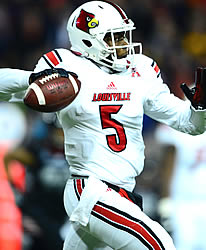As we begin the countdown to the NFL Draft starting on May 8, I will spend anywhere from 4-8 hours to break down the strengths and weaknesses of at least the top 20 or so offensive skill-position prospects available in this draft.

Teddy Bridgewater: The safest QB pick in the draft.
Vitals
College: Louisville
Height/Weight: 6’2”/214
Hands: 9 1/4”
Important NFL Combine Numbers
40-Yard Dash: 4.67
Vertical Jump: 30”
Broad Jump: 9’5”
20-Yard Shuttle: 4.20
Background (College Stats)
Bridgewater, who originally committed to Miami (Fla.) before landing at Louisville, entered college as the second-rated quarterback prospect in the nation by Rivals.com. The Miami native – the first freshman quarterback to start at the school since Stu Stram in 1976 – went on to be named Big East Rookie of the Year in 2011 despite a 14:12 touchdown-to-interception ratio. He proved to be a quick study in Cardinals OC Shawn Watson’s offense as he compiled a 58:12 TD-INT ratio over the final two years of his college career. Bridgewater was already generating a fair amount of buzz near the end of the 2012 season before leading Louisville to a surprising 33-23 victory in the Sugar Bowl over a Florida team that saw five of its defenders get drafted last April, including two in the first round. Bridgewater toyed with the American Athletic Conference in his final season and finished off his college career with a virtuoso 447-yard, four-touchdown (three passing, one rushing) performance against his hometown team in the Russell Athletic Bowl, wrapping up a season in which he completed 71 percent of his passes in a pro-style offense and threw for 3,970 yards, 31 touchdowns and only four interceptions.
NFL Player Comp(s): A poor man’s Aaron Rodgers
Strengths
- Shows fearlessness against the blitz, does not get rattled after taking a jarring shot from a defender and keep his eyes downfield.
- Uses eyes/feet to manipulate safeties as well as any college quarterback in the last two draft classes.
- Makes quick/sound decisions and is rarely ever caught off-guard; ball is almost always gone a split-second after he completes his drop.
- Was trusted to make his own checks/audibles at the line of scrimmage (as opposed to the majority of college quarterbacks nowadays that look to the sideline after defense has set).
- Very accurate; short and intermediate throws are often extended handoffs.
- Exceptional touch on fades as well as throws on the move (left or right).
- Moves well inside the pocket and has a good feel for backside pressure.
- Play exudes confidence in his ability; knows the difference between fitting and forcing a throw into a tight window.
Weaknesses
- Long-ball accuracy (only completed 39% of throws that traveled 20-plus yards).
- Slightly above-average arm strength is exposed on deep throws as ball can get hung up in the air.
- Lean build did not necessarily lead to wrist/ankle injuries at college level, but could be a problem in the NFL.
- Less-than-ideal release point (ball often comes out near his ear as opposed to over the shoulder), leading to a few more tipped passes.
- Can run well enough to pick up the first down, but is not a breakaway threat as a runner.
- Doesn’t always protect himself outside the pocket, opening him up for big hits on outside throws or in an effort to pick up yards on the ground.
Bottom Line
It’s rare that a prospect comes along that has virtually little-to-no “bust potential”, especially at the quarterback position, but Bridgewater may very well be that player in this class. Let’s be clear: he is not an elite prospect so much as he is a player capable of being an above-average quarterback for the next decade. While his ceiling isn’t as high as some of his other highly-ranked counterparts (Johnny Manziel has more athleticism and Blake Bortles is an unfinished product with prototypical size for the position), playing quarterback in the NFL is much more of a mentally-taxing job than it is a physically-taxing one in a lot of cases. Bridgewater is the rare combination of a college player that can outthink a defense and has enough ability to do something about it. Watson believes quarterbacks are better served by learning defensive theory first and his playbook second. When watching Bridgewater play, it is hard to argue against Watson’s methodology given how often his pupil simply appeared as if he was always a step or two ahead of opposing defenses. Critics have been quick to point out Bridgewater’s lack of accuracy as a deep-ball thrower, but Louisville’s offensive philosophy is based on short-to-long reads whereas most NFL teams work in a deep-to-short manner. As a result, Bridgewater’s deep throws can sometimes be his second or third read in the progression, meaning he has less time and more pressure to make those kind of throws than most quarterbacks. While he is not the complete package like Andrew Luck or the athlete that Robert Griffin III, Ryan Tannehill or Russell Wilson are, few quarterback prospects in recent memory are more prepared to play in the NFL from the neck up than Bridgewater.
